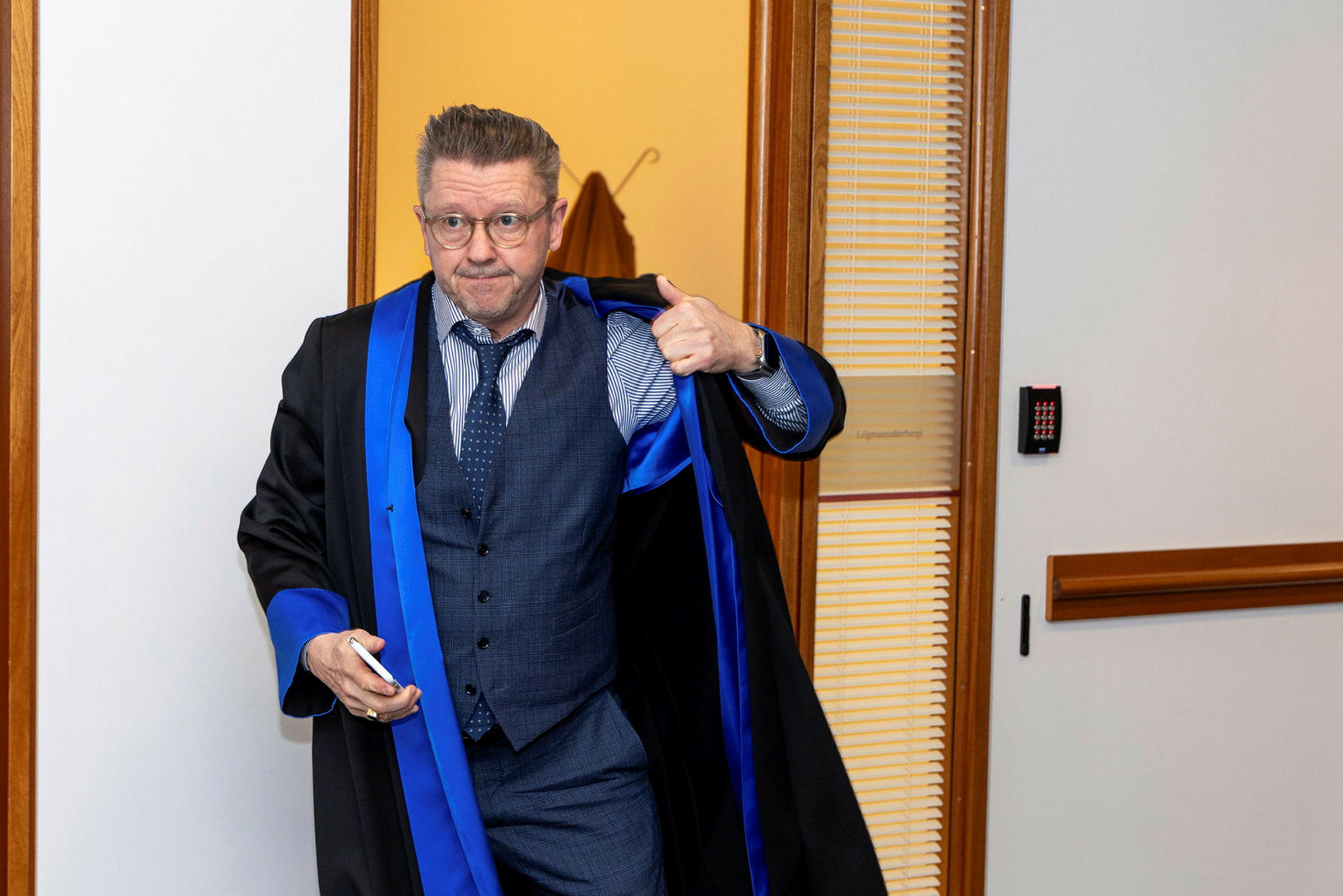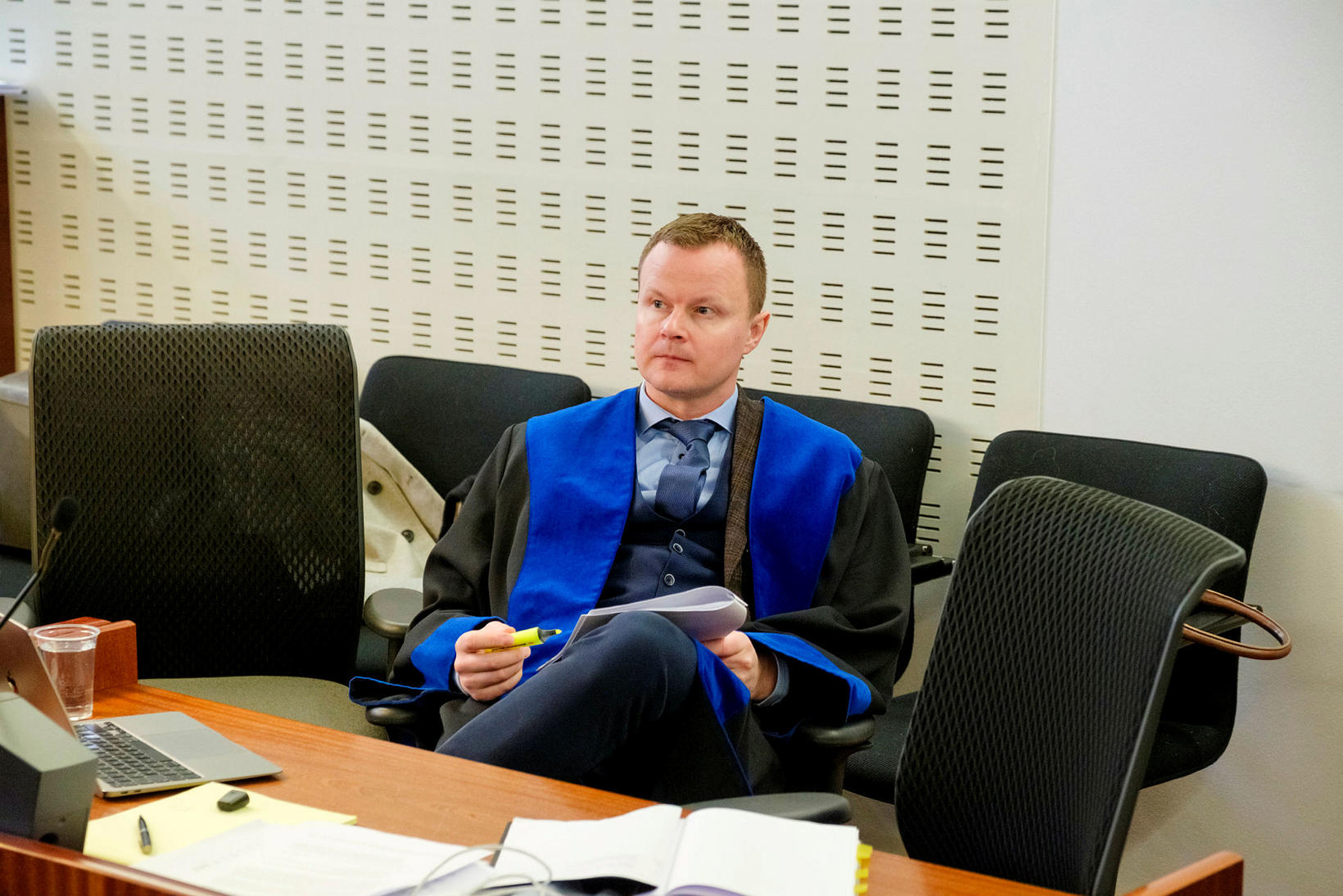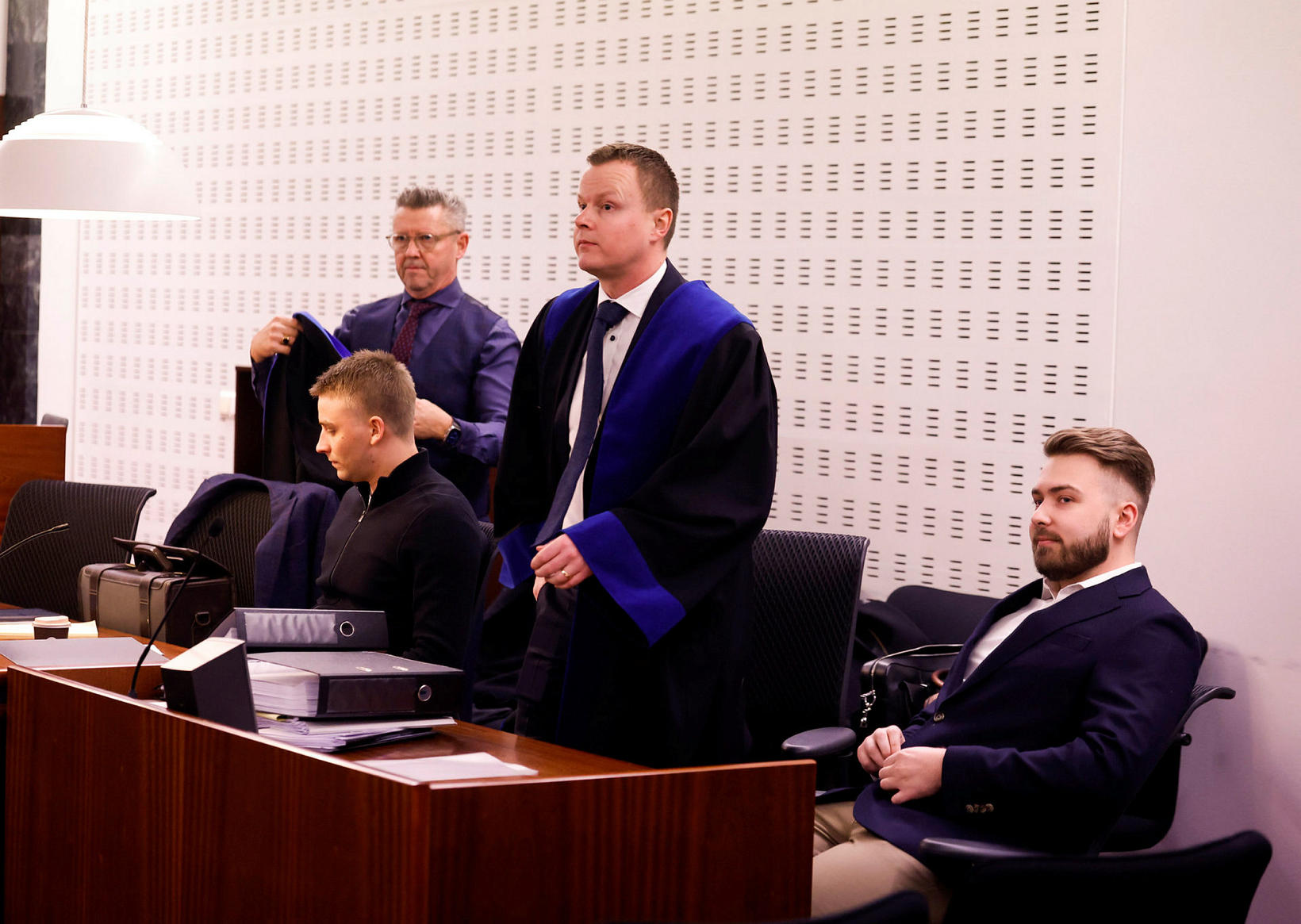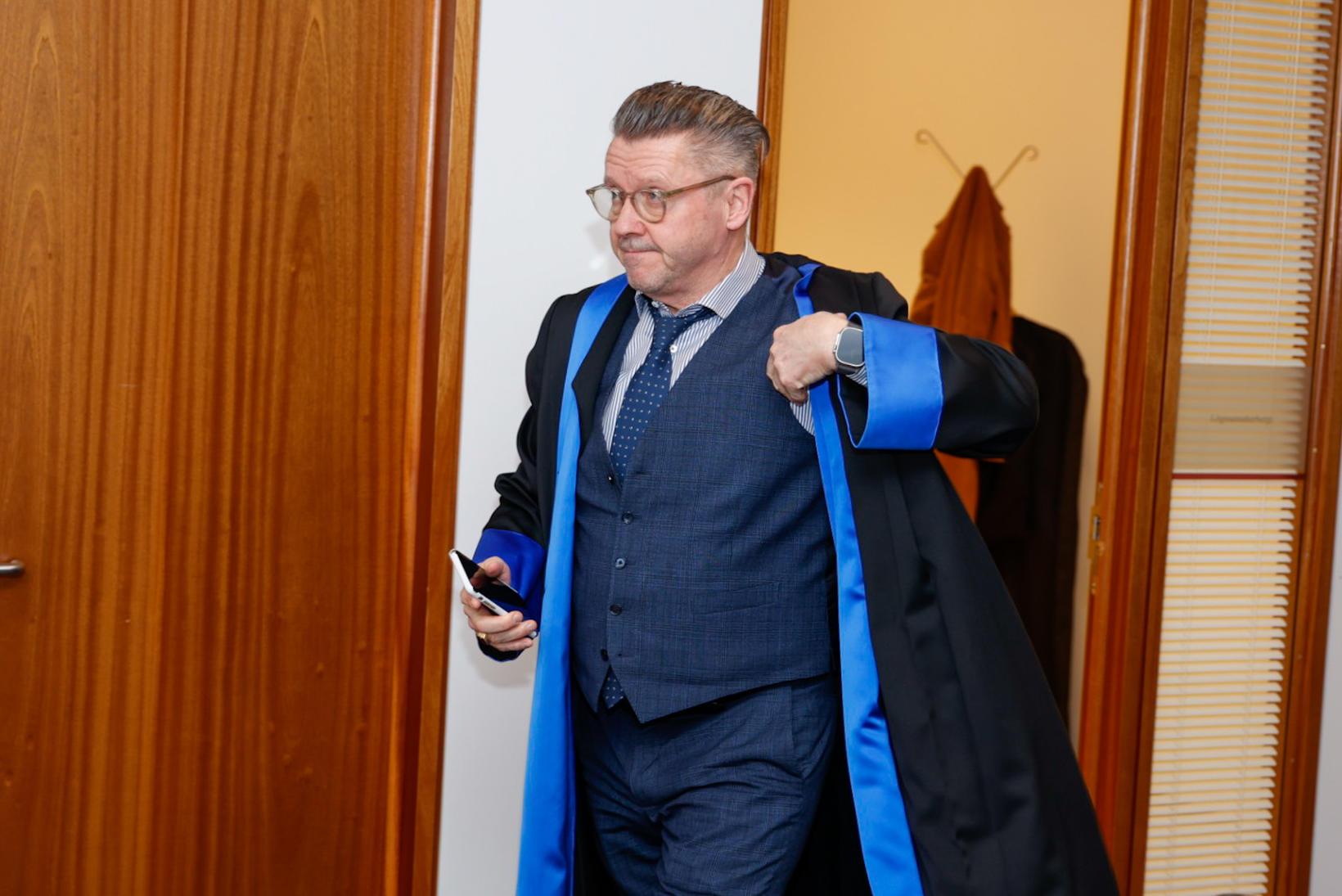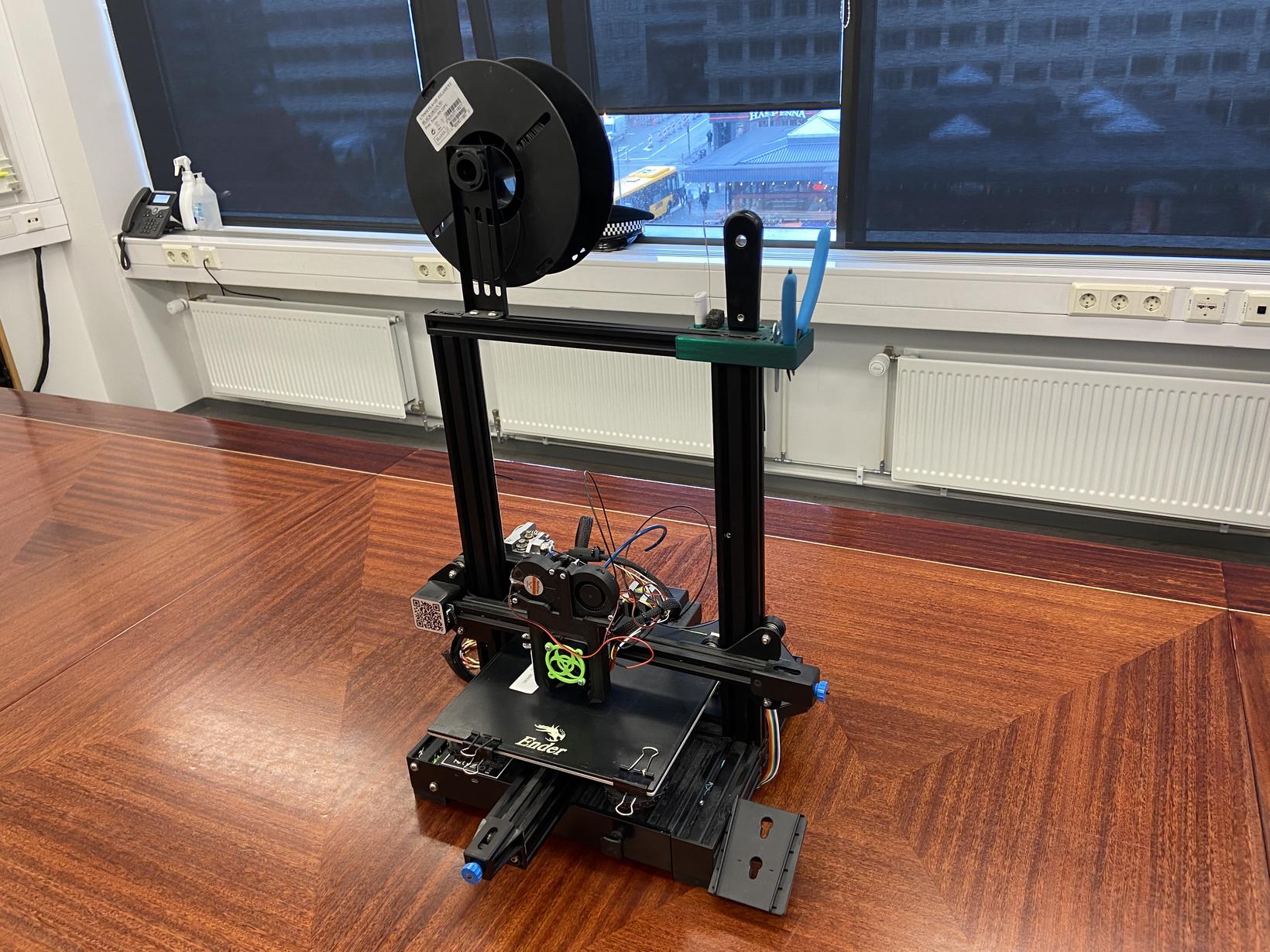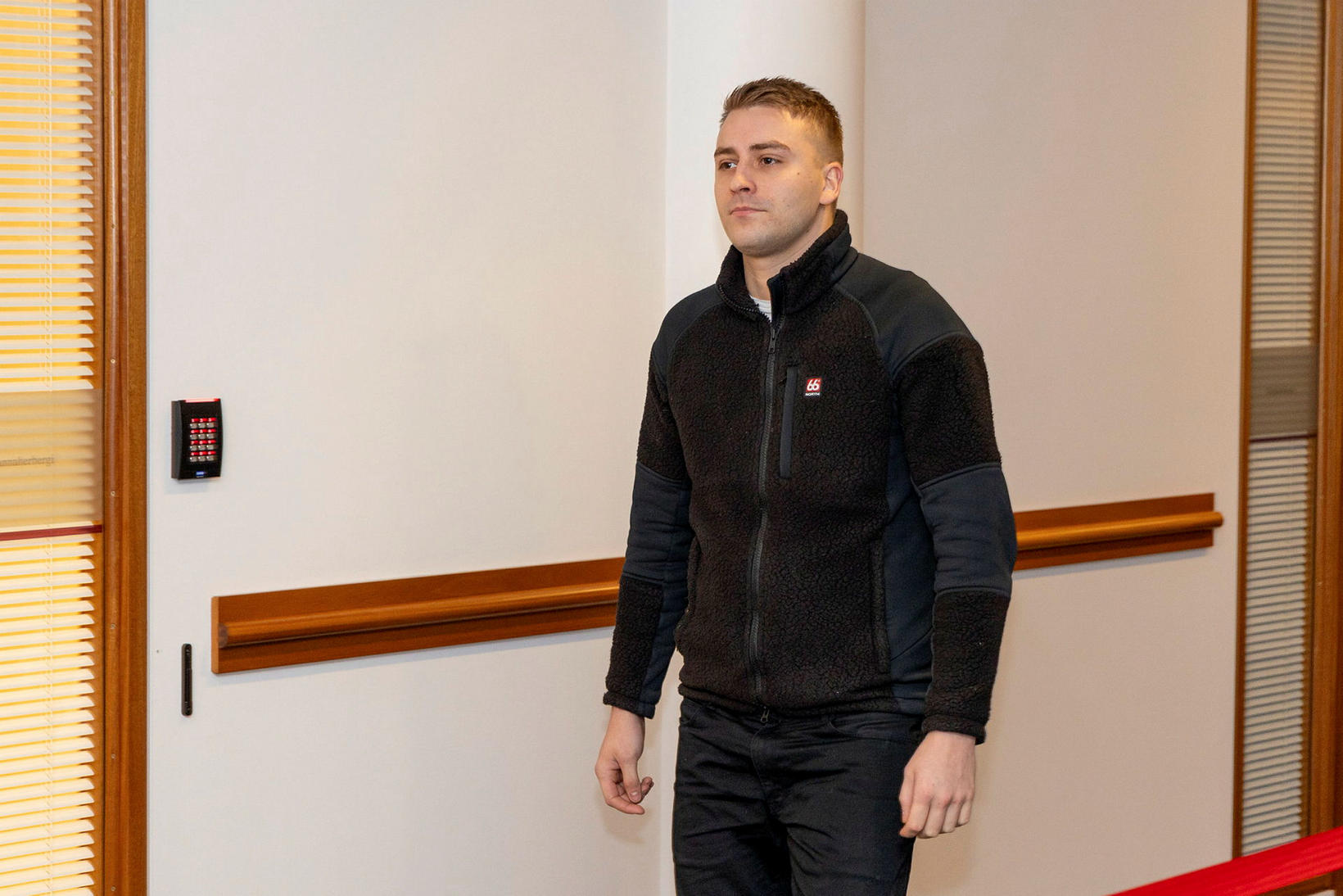The defense: "Not a Mormon, even though the ideology is studied"
Sveinn Andri Sveinsson, Birgisson's defense attorney, in the Supreme Court this week. mbl.is/Karítas
"I say a lot and maybe I don't mean anything by it. I'm not alone in that." These words that Sindri Snær Birgisson uttered are what his defense attorney, Sveinn Andri Sveinsson, wants to say are the essence of the terrorism case. The communication between Sindri Snær Birgisson and Ísidór Nathansson was only careless and vulgar talk, not part of the preparation for acts of terrorism.
The main hearing of the case continued this week in the Supreme Court despite the extreme weather, and the defendants' relatives, among others, were present in the courtroom to observe the arguments of Sveinn Andri Sveinsson and Einar Oddur Sigurðsson, Nathanson's defense attorney.
The arguments of prosecutor Anna Barbara Sigurðardóttir took place the day before.
A year has passed
Almost a year has passed since Birgisson was acquitted of attempted terrorism in the Reykjavík District Court and Nathansson was consequently acquitted of Birgisson's involvement in the crime. However, they were convicted of a major weapons offense, Birgisson to 24 months in prison and Nathansson to 18 months in prison.
The men's defense lawyers are demanding that they be acquitted entirely of the terrorism part of the charge and that they be partially acquitted of the weapons offenses. They are also demanding that they be sentenced to the lightest sentence the law allows for the offenses to which they have partially confessed.
One of the most serious criminal cases in history
The case of Sveinsson and Sigurðsson largely echoed their previous case in the district court. A discussion of them can be read below.
Sigurðsson said that the case was probably the most serious in Icelandic legal history. The scope of the case was very large and rarely has so much effort been put into investigating a case.
They both discussed these actions and the police investigation, which they said had been characterized by narrow-mindedness, preconceived ideas, misinterpretations, and questionable investigative methods.
Einar Oddur Sigurðsson, Nathanson's defense attorney, in the district court over a year ago. mbl.is/Kristinn Magnússon
Investigative interests not imminent danger
Sveinsson criticized the wording in the appealed judgment, which stated that the “disgusting remarks” of both defendants and their actions “gave, in the opinion of the court, full cause for police action in the case when the defendants were arrested”.
The men were arrested on September 21, 2022, the day after authorization for certain coercive measures was issued.
In the case of Chief Inspector Karl Steinar Valsson before the District Court, it was stated that the arrest was primarily due to investigative interests, as Nathansson had received information about police surveillance of them.
At a police press conference the next day, it was later revealed that a terrorist attack had been prevented.
Sigurðsson made it clear that there was no imminent danger, but that the interests of the investigation were paramount.
The defense attorneys both said that the police investigation was then based on pre-determined theories and overinterpretations that the partners were dangerous terrorists. The fundamental view of objectivity was “thrown out the window”.
The communication was not encrypted
Sveinsson mentioned that there was talk that the two people’s communication was on an encrypted application, Signal.
However, the settings of their conversations were such that they were open, similar to Messenger. No special password was required for the application and they did not have the communication set up to be deleted, even though the application offered it.
Sveinsson said that the courts had been riddled with misrepresentations when making demands for detention, but the men were released on December 13, 2022, after the Supreme Court did not agree that the danger and defense considerations no longer existed.
Sigurðsson said that the courts' handling of demands for detention was interesting and gave insight into how the criminal case was assessed.
Following the release of Birgisson and Nathansson, the National Commissioner of Police raised the alert level due to the terrorist threat and it is still unchanged.
Sveinsson, Bigisson, Sigurðsson and Nathansson in the District Court a year ago. mbl.is/Eggert Jóhannesson
Headache for the Supreme Court
Similar to the prosecutor's argument, the men's intentions were discussed extensively in the speeches of Sveinsson and Sigurðsson. Article 20. of the General Penal Code is the central point and an unambiguous keyword. It states:
Anyone who has decided to commit an act punishable by this Act, and has unequivocally demonstrated the intention in the act that aims or is intended to aim at the commission of the offense, has, when the offense is not completed, been guilty of an attempt to do so.
This experimental provision of the Act has been little tested in Icelandic law, and Sveinsson said that it would be a “headache” for the National Court to discuss this provision and whether the word unequivocally affects the court’s assessment.
In his opinion, this wording means tightening the requirement for proof of intent.
Internet search queries are an extension of thinking
Both defense attorneys mentioned the so-called Akranes arson case from 1948, where men were acquitted for talking about burning down houses. That case stated that thoughts and speculation are not punishable.
Sveinsson said that in modern society, internet search queries are an extension of human thinking. He described how people have begun to think spontaneously on the Internet.
The defense attorney said that millions of people view material like Birgisson and Nathansson viewed about mass murder and extremism. People are simply interested in human behavior.
Sveinsson gave as an example that he would not become a vegan or a Mormon even if he studied the ideology. mbl.is/Karítas
They had not internalized the material and cited as an example that even though he would study the Mormon faith or the lifestyle of vegans, it did not mean that he was a Mormon or a vegan.
Sigurðsson said that Nathansson had been like an open book throughout the case. He admitted that he had collected material, and familiarized himself with some of it but did not adopt it.
Nathansson had made no bones about having espoused certain political views that not everyone agreed with, but that he had not shown any particular enthusiasm to influence Birgisson.
No preparation
Sveinsson said that none of the 64 charges in the indictment against Birgisson could be interpreted as a preparatory act for terrorist acts. Sigurðsson agreed with this and said considerably more to convict the men.
Sveinsson did mention, however, that it is possible that item 52, which states that Birgisson had gone to the scene of the attack and measured the distance between the gates intending to check whether it was possible to drive a large vehicle through them, could be considered a preparatory act. The prosecution, however, has dropped that item.
“One never moves from the phase of thoughts and conversation to any actions,” said Sveinsson in his speech.
He then mentioned that Birgisson had never acquired raw materials or equipment for bomb-making or drone-making. The only thing he had bought was a poor-quality Chinese vest.
The weapons produced for enrichment
Both defense attorneys said the defendants had 3D-printed firearms for income. The prosecution's hypothesis that it was to finance terrorist acts was unfounded.
You can't sell your cake and eat it at the same time, Sveinsson said.
He then said that if Birgisson had lacked the funds to carry out terrorist acts, he would probably have taken out a loan on his apartment or sold it.
Thoughts and fantasies
Sigurðsson and Sveinsson criticized that the men's communication was cut up by the police and taken out of context.
Sveinsson described the communication as sarcastic, empty, in bad taste and that it was a meaningless chatter. No comments had been made following the act.
Sigurðsson said that it was a matter of imagination and fantasies that appeared mixed with obvious sarcasm.
Choking his grandmother in an airport toilet
Sveinsson said that the prosecution was right in that the comments must be put in context and the overall picture must be considered. That was the crux of the matter, but that the prosecution did not follow up on that.
Sigurðsson agreed and said that the men had gone from one thing to another and therefore it was only careless talk.
Sveinsson mentioned a message that Nathansson sent in which he joked about choking his grandmother and leaving her in an airport toilet. The conversation was brief and quickly turned into another conversation.
He said that it was necessary to consider that sometimes it was a joke. When someone said "joke", it took all the sting and seriousness out of the conversation.
Sigurðsson said that it was two young men talking to each other who should never be seen by a third party. It would be unacceptable to suggest a literal interpretation of what they said based on their statements, witnesses, and the assessment of a psychiatrist.
Dissatisfied with the defense attorney's fees
Both defense attorneys demand that their defense attorney's fees be reviewed.
The District Court ruled that the defendants paid a quarter of their defense attorney's fees, which totaled 22 million. Three-quarters of the costs were paid from the state treasury.
Sveinsson and Sigurðsson said that 95% of their work went into the terrorism part of the case. Therefore, the state treasury should foot the bill for the acquittal by far.
Sveinsson then said that the time report had been screwed up and he believes he has only been paid for 60% of the work.
"Both defense attorneys spent a hell of a lot of time on this work," he said, reviewing the scope of the case.

